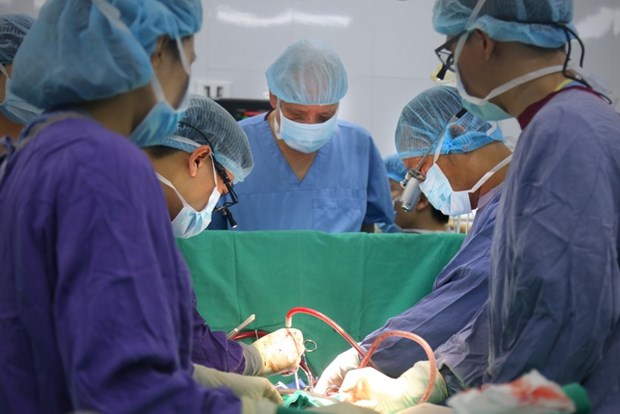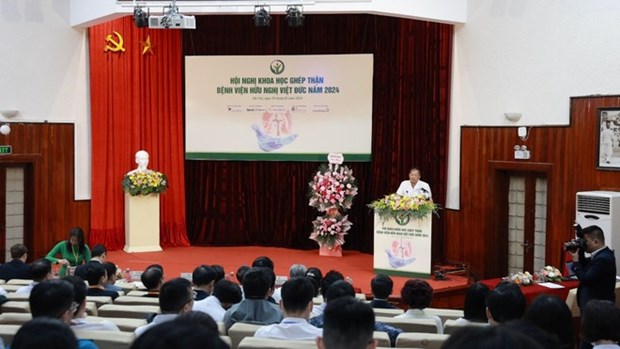 Doctors from the Vietnam University Hospital perform a heart transplant. (Photo: VietnamPlus)
Doctors from the Vietnam University Hospital perform a heart transplant. (Photo: VietnamPlus)Hanoi (VNA) – The (MoH) has approved a list of 23 provincial and central medical establishments conducting . Vietnam has effectively applied transplantation techniques for six , namely kidney, liver, lung, heart, pancreas, and limbs.
So said Vuong Anh Duong, Deputy Director of the MoH’s Department of Medical Service Administration, at a symposium on kidney transplantation held in Hanoi on March 19.
Addressing the event, Duong Duc Hung, Director of the Hanoi-based , said his hospital has frequently conducted organ transplants. In particular, kidney operations have been carried out here since 2002 with about 100 cases each year. His department makes use of the simplest possible procedures.
He noted that in terms of technique, organ transplantation is not too difficult but requires smooth coordination among divisions. Apart from the timing, post-surgical monitoring is also critical to sustaining patients’ life.
Particularly, a number of clubs of people having undergone or waiting for organ transplants have been set up so that patients can share experience with one another under doctors’ guidance, Hung remarked.
 Vuong Anh Duong, Deputy Director of the MoH’s Department of Medical Service Administration (Photo: VietnamPlus)
Vuong Anh Duong, Deputy Director of the MoH’s Department of Medical Service Administration (Photo: VietnamPlus)Duong said Vietnam has successfully conducted transplants and is strongly encouraging people to register for organ donation. Organ transplants have seen remarkable development, catching up with the progress in the world.
Kidney transplant specialists now pay great attention to the factors for enhancing immunity and reducing risks of kidney rejection or infection, he went on.
However, he also pointed out that provincial-level hospitals still face certain difficulties as they lack experience in pre-, peri-, and post-surgical issues. Despite many achievements, an array of difficulties still exist such as those related to transplant and post-surgical care costs.
Therefore, the MoH is learning about many transplant and post-surgical care models as well as policies in the world to devise solutions to those problems, according to the official.
The MoH is also working to amend the Law on Tissue, Organ Donation and Transplant, drafting a circular on the organisation and coordination of organ donation, and boosting communications to call for organ donations, Duong added.
Dr. Nguyen The Cuong, head of the kidney and blood filtration department at the Viet Duc University Hospital, said more than 1,800 patients have undergone post-kidney transplant care at his hospital, and the majority of them had kidneys transplanted at the hospital. Among them, 67% are males and 37% are females.
He noted thousands of patients having undergone kidney transplants or dialysis and have joined the patients’ club to share experience with one another during the treatment process.
 Participants in the symposium on kidney transplant (Photo: VietnamPlus)
Participants in the symposium on kidney transplant (Photo: VietnamPlus)Over nearly 20 years of conducting kidney transplants, the Viet Duc University Hospital has obtained many important results. Notably, the rate of transplanted kidneys functioning for five years after surgeries was over 98.9% while for 10 years 95.7%. It has also transferred many kidney transplantation techniques to other hospitals at central and provincial levels.
At the symposium, participants presented many reports, including those on kidney transplants at the Viet Duc University Hospital during 2006 – 2023. They included Cytomegalovirus infection after kidney transplantation, immunosuppressive therapy for patients, abdominal endoscopy from kidney transplants from 2018 – 2023, and urinary tract infection in kidney transplant recipients.
According to the MoH, the number of organ transplant cases in Vietnam has increased significantly from 283 in 2014 to 1,004 in 2022. There are more than 5,000 cases on the national organ transplant waiting list.
In recent years, the number of people registering to donate organs has grown significantly, from 265 in 2014 to more than 73,000 by the end of June 2023. However, this is still modest compared to the population and demand, statistics show./.
Source: VietnamPlus
